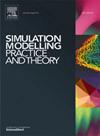PyAdMesh: A novel high-performance software for adaptive finite element analysis
IF 3.5
2区 计算机科学
Q2 COMPUTER SCIENCE, INTERDISCIPLINARY APPLICATIONS
引用次数: 0
Abstract
This study introduces PyAdMesh, an open-source software for reducing discretization errors in finite element analysis using an h-adaptive method. Adaptive approaches iteratively refine meshes to minimize errors but require substantial computational resources due to repeated analyses. PyAdMesh addresses this challenge by employing efficient data transfer operators for displacement, stress, and strain, avoiding full reanalysis. The software achieves performance gains through parallel processing on CPU and GPU, leveraging CuPy, Numba, and Python’s multiprocessing library. GPU parallelization achieves speed-ups of 30 times compared to serial execution, while CPU parallelization yields an 8-fold improvement. PyAdMesh reduces discretization error from 5.5% to 0.07% using a recovery-based error estimation method. Despite low-end hardware, including an Intel Xeon 6148 CPU and NVIDIA Quadro P4000 GPU, the software demonstrates significant potential for adaptive finite element analysis. Future studies should explore its performance on high-end hardware. This work highlights PyAdMesh’s potential for large-scale engineering simulations, balancing computational efficiency and accuracy.
PyAdMesh:一种新颖的高性能自适应有限元分析软件
本文介绍了开源软件PyAdMesh,该软件使用h-自适应方法减少有限元分析中的离散化误差。自适应方法迭代细化网格以最小化误差,但由于重复分析需要大量的计算资源。PyAdMesh通过采用高效的位移、应力和应变数据传输操作符来解决这一挑战,避免了完全的重新分析。该软件通过在CPU和GPU上并行处理,利用CuPy、Numba和Python的多处理库来实现性能提升。与串行执行相比,GPU并行化的速度提高了30倍,而CPU并行化的速度提高了8倍。PyAdMesh使用基于恢复的误差估计方法将离散化误差从5.5%降低到0.07%。尽管硬件较低端,包括英特尔至强6148 CPU和NVIDIA Quadro P4000 GPU,但软件显示出自适应有限元分析的巨大潜力。未来的研究应该探索其在高端硬件上的性能。这项工作突出了PyAdMesh在大规模工程模拟方面的潜力,平衡了计算效率和准确性。
本文章由计算机程序翻译,如有差异,请以英文原文为准。
求助全文
约1分钟内获得全文
求助全文
来源期刊

Simulation Modelling Practice and Theory
工程技术-计算机:跨学科应用
CiteScore
9.80
自引率
4.80%
发文量
142
审稿时长
21 days
期刊介绍:
The journal Simulation Modelling Practice and Theory provides a forum for original, high-quality papers dealing with any aspect of systems simulation and modelling.
The journal aims at being a reference and a powerful tool to all those professionally active and/or interested in the methods and applications of simulation. Submitted papers will be peer reviewed and must significantly contribute to modelling and simulation in general or use modelling and simulation in application areas.
Paper submission is solicited on:
• theoretical aspects of modelling and simulation including formal modelling, model-checking, random number generators, sensitivity analysis, variance reduction techniques, experimental design, meta-modelling, methods and algorithms for validation and verification, selection and comparison procedures etc.;
• methodology and application of modelling and simulation in any area, including computer systems, networks, real-time and embedded systems, mobile and intelligent agents, manufacturing and transportation systems, management, engineering, biomedical engineering, economics, ecology and environment, education, transaction handling, etc.;
• simulation languages and environments including those, specific to distributed computing, grid computing, high performance computers or computer networks, etc.;
• distributed and real-time simulation, simulation interoperability;
• tools for high performance computing simulation, including dedicated architectures and parallel computing.
 求助内容:
求助内容: 应助结果提醒方式:
应助结果提醒方式:


